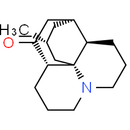Description
Lycopodine, a pharmacologically important bioactive component derived from Lycopodium clavatumspores, triggers apoptosis by modulating 5-lipoxygenase, and depolarizing mitochondrial membrane potential in refractory prostate cancer cells without modulating p53 activity. Lycopodine inhibits proliferation of HeLa cells through induction of apoptosis via caspase-3 activation.
Product information
CAS Number: 466-61-5
Molecular Weight: 247.38
Formula: C16H25NO
Chemical Name: (1R, 2R, 10S, 13S, 15R)-15-methyl-6-azatetracyclo[8.6.0.0, .0, ]hexadecan-11-one
Smiles: C[C@@H]1C[C@H]2CC(=O)[C@H]3CCCN4CCC[C@H]2[C@@]43C1
InChiKey: BCZFSDNVXODRAJ-JTTNIQEDSA-N
InChi: InChI=1S/C16H25NO/c1-11-8-12-9-15(18)14-5-3-7-17-6-2-4-13(12)16(14,17)10-11/h11-14H,2-10H2,1H3/t11-,12+,13-,14-,16-/m1/s1
Technical Data
Appearance: Solid Power
Purity: ≥98% (or refer to the Certificate of Analysis)
Solubility: Soluble in DMSO
Shipping Condition: Shipped under ambient temperature as non-hazardous chemical or refer to Certificate of Analysis
Storage Condition: Dry, dark and -20 oC for 1 year or refer to the Certificate of Analysis.
Shelf Life: ≥12 months if stored properly.
Stock Solution Storage: 0 - 4 oC for 1 month or refer to the Certificate of Analysis.
Drug Formulation: To be determined
HS Tariff Code: 382200
How to use
In Vitro:
Lycopodine (5.22-78.3 μg/mL; 12 hours) has 50% viability at 57.62±0.086 μg/mL and 51.46±1.43 μg/mL for PC3 and LnCaP, respectively. Treated with Lycopodine (74-222 mM; 12 hours), the apoptotic index is with respect to the gradual increase in doses for the PC3 and LnCaP cells. Lycopodine (74-222 mM; 12 hours) induces cell cycle arrest at G0/G1 phase in PC3 and LnCaP cells. Lycopodine (0-200 µg/mL; 48 hours) shows cytotoxicity to HeLa cells in a dose and time dependent manner. However, Lycopodine shows minimal cytotoxic effects in normal peripheral blood mononuclear cells (PBMC) even at the highest dose (200 µg/mL). Lycopodine (100, 200 µg/mL; 24 hours) increases level of Bax and decreases the mitochondrial cytochrome c. This is followed by an increase in expression of cytochrome c in cytosolic fraction. Lycopodine also cleaves the caspase-3 in the total cell lysate, while the expression of Bcl-2 is down regulated.
References:
- Bishayee K, et al. Lycopodine triggers apoptosis by modulating 5-lipoxygenase, and depolarizing mitochondrial membrane potential in androgen sensitive and refractory prostate cancer cells without modulating p53 activity: signaling cascade and drug-DNA interaction. Eur J Pharmacol. 2013 Jan 5;698(1-3):110-21.
- Mandal SK, et al. Lycopodine from Lycopodium clavatum extract inhibits proliferation of HeLa cells through induction of apoptosis via caspase-3 activation. Eur J Pharmacol. 2010 Jan 25;626(2-3):115-22.
Products are for research use only. Not for human use.
Payment & Security
Your payment information is processed securely. We do not store credit card details nor have access to your credit card information.


